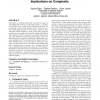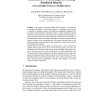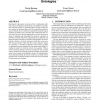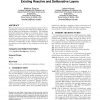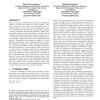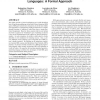97
Voted
ATAL
2006
Springer
15 years 4 months ago
2006
Springer
The ability to coordinate effectively is critical for agents to accomplish their goals in a multi-agent system. A number of researchers have modeled the coordination problem for m...
89
Voted
ATAL
2006
Springer
15 years 4 months ago
2006
Springer
In this paper we present the Behaviosite paradigm, a new approach to affecting the behavior of distributed agents in a multiagent system, which is inspired by biological parasites ...
ATAL
2006
Springer
15 years 4 months ago
2006
Springer
Selecting the right parties to interact with is a fundamental problem in open and dynamic environments. The problem is exemplified when the number of interacting parties is high a...
108
Voted
ATAL
2006
Springer
15 years 4 months ago
2006
Springer
We investigate trust-based relationships in electronic supply chains where trust is a measure of consistency in meeting negotiated contract deadlines. We consider scenarios where ...
93
Voted
ATAL
2006
Springer
15 years 4 months ago
2006
Springer
The DEFACTO system is a multiagent based tool for training incident commanders for large scale disasters. In this paper, we highlight some of the lessons that we have learned from...
ATAL
2006
Springer
15 years 4 months ago
2006
Springer
Hybrid architectures have been developed to preserve the responsiveness of reactive layers while also providing the benefits of higher level deliberative capabilities. The challen...
95
Voted
ATAL
2006
Springer
15 years 4 months ago
2006
Springer
In the recent past, several different methods for coordinating behavior in multi-robot teams have been proposed. Common to most of them is the use of communication to coordinate b...
ATAL
2006
Springer
15 years 4 months ago
2006
Springer
We present a logic for reasoning both about the ability of agents to cooperate to execute complex actions, and how this relates to their ability to reach certain states of affairs...
98
Voted
ATAL
2006
Springer
15 years 4 months ago
2006
Springer
This paper provides a general mechanism and a solid theoretical basis for performing planning within Belief-Desire-Intention (BDI) agents. BDI agent systems have emerged as one of...
86
Voted
ATAL
2006
Springer
15 years 4 months ago
2006
Springer
Abstract. We introduce take-it-or-leave-it auctions (TLAs) as an allocation mechanism that allows buyers to retain much of their private valuation information, yet generates close-...
